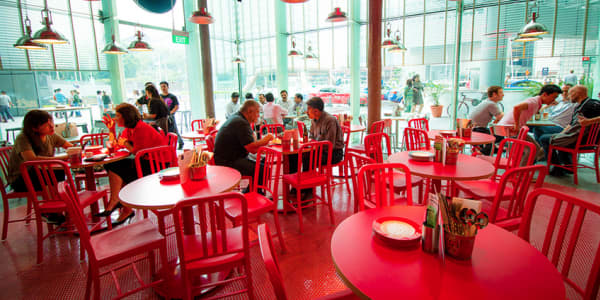
A shop located in the old hutongs, or narrow alleys, of Beijing serves as a one-stop center for aspiring entrepreneurs to find help navigating the new world of start-ups.
"It is a creative and unique place, with a co-working space where people can share ideas and receive all kinds of help as they pursue the path of entrepreneurship," Zhou Kang, who is in his mid-20s and dreams of starting his own business, told CNBC.
The center, which Zhou visits twice every fortnight, is a two-storey shop called Tech Temple. Spanning almost 2,000 square meters, it consists of an open office equipped with 280 work stations and services in legal consultancy, human resources, finances, investments and loan information, as well as an event space for up to 100 people, meeting rooms and a café – just about everything a start-up needs under one roof.
Founded in 2013, Tech Temple targets early-stage internet startups with cheap office space. A desk space can be rented at 1,600 yuan ($258) per month.
"In 2012, I saw that many start-ups were in need of more office space so I decided to start an entrepreneur eco-system, which acts as a one-stop center offering office space and all kinds of services for all entrepreneurs, be it internet-based or other fields, such as entertainment and fashion," Jerry Wang, head of Tech Temple, said.
Another main draw for Tech Temple customers like Zhou is the "salon activities," or informal seminars that "help entrepreneurs find partners, customers, investments and resources for rapid growth," according to Wang.
Read More Chinese real estate tycoon bets on 'uber for offices'
China's start-up wave
Apart from co-working spaces like Tech Temple, cafes operating with a similar concept are also mushrooming in tech hubs located in Beijing, Shanghai and Shenzhen as a growing number of ambitious young Chinese, inspired by the success of internet giants such as Alibaba, jump on the entrepreneurship bandwagon.
The government's focus on innovation and entrepreneurship, in an attempt to reverse a slowdown in the economy, has also contributed to the rise of newly registered enterprises. In the first half of 2015, new company registrations rose 19.4 percent from a year ago to 2.1 million, according to government statistics.
Offering more than much-needed caffeine, these cafes are hotspots for young entrepreneurs offering a desk, power supply and internet connection for a fee as low as a cup of coffee. Some coffee houses also assume the role of business incubators as well.
Read MoreDianrong: The start-up that's building China's banking system
Among the most notable is 3W Café. Widely seen as one of the pioneers in the start-up cafe scene, it counts recruiting website Lagou as one of its most influential start-ups. Located in Beijing's Zhongguancun Hi-Tech Development Zone - called China's answer to the U.S.' Silicon Valley - the five-year-old cafe made headlines after a visit by Chinese Premier Li Keqiang two months ago.
The May 7 visit was reported by state media and photographs showing the premier speaking to young entrepreneurs over a cup of coffee were widely circulated on social media. The premier's visit was seen as a fresh commitment by Beijing to promote entrepreneurship. Coupled with an improving business environment, entrepreneur Kang reckons China is in a "golden age" for budding entrepreneurs like himself.
"In terms of software, there's a lot of government support. Hardware-wise, there is faster internet, increased usage of mobile devices, [which creates] greater demand and a bigger market... Meanwhile, [places like Tech Temple] support aspiring entrepreneurs," Kang told CNBC.
Making ends meet
Despite being welcomed by the country's new generation of entrepreneurs, these co-working spaces and cafes have found themselves struggling to make ends meet while keeping fees low amid rising costs.
There is also the issue of stiffening competition. According to statistics provided by the China Start-ups Incubators Alliance (CSIA), the number of co-working spaces and cafes catering to start-ups across China rose to 1,000 after Premier Li's high-profile visit to 3W Coffee in May, from 200 in 2014.
While government subsidies have been made available – for example, the Administrative Committee of Zhongguancun granted the credential of "private business incubator" to 3W Café, giving it privileges on taxation, licensing and other issues - these businesses are still mostly left to fend for themselves.
"Subsidies can't solve the problem. It is good, but these cafes remain under a lot of pressure and it's hard for them to be profitable. The revenue from F&B or membership fees isn't enough to cover operating costs so they have to organize events, offer consultations and other services," Arrow Deng, secretary general of CSIA, told CNBC by phone.
Tech Temple's Wang agrees: "To continue helping other entrepreneurs and start-up teams, we also need to ensure that we grow and develop steadily. So for us, Tech Temple is also a business."




